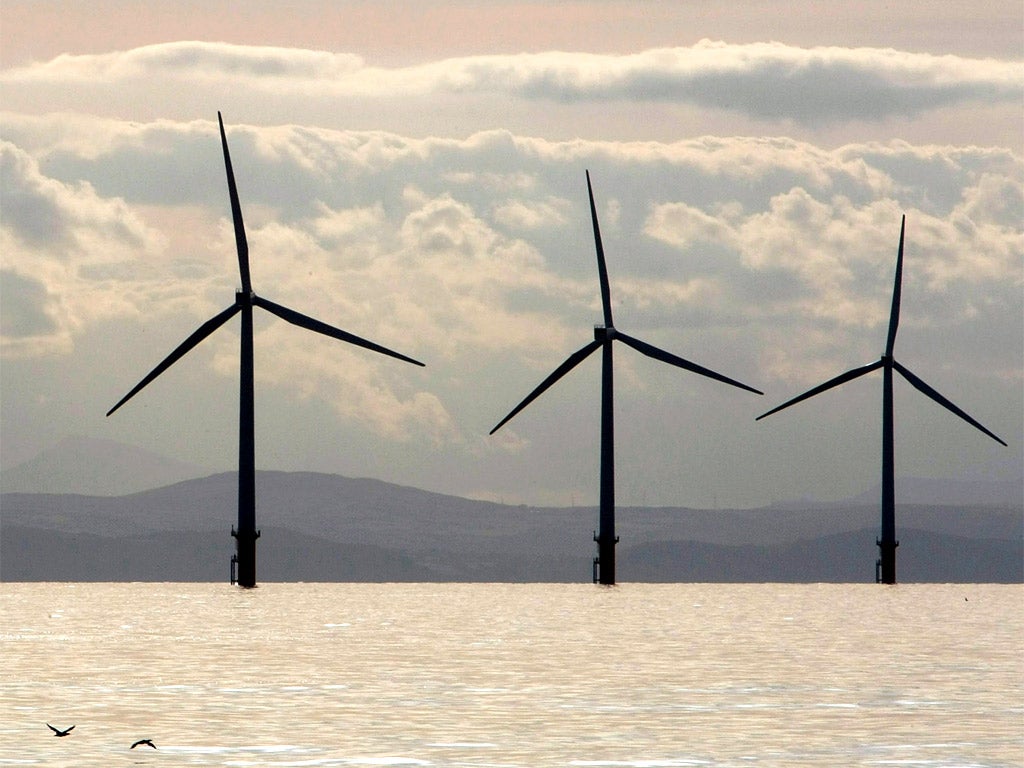George Osborne's U-turn could add £200bn to energy bills
Chancellor’s plan to scrap climate change targets could cost every household £8,000

The average British household could eventually end up paying an extra £8,000 for its gas and electricity if George Osborne succeeds in delaying vital action to make Britain greener, the Government’s official climate change advisers warn today.
Postponing decisive action to cut carbon emissions by 10 years to 2030, through measures such as a widespread shift to renewable energy sources, will add at least £100bn to Britain’s collective household energy bills between 2030 and 2050, according to the independent Committee on Climate Change (CCC). This works out to £4,000 per household.
The increase is because Britain would need to take even more drastic action to make up lost ground to ensure it hits its legally binding target of reducing carbon emissions by 80 per cent from 1990 levels.
And if fossil fuel prices soar to the top of the range of realistic forecasts, the bill to remedy the delayed switch to a low-carbon society could reach £200bn, or £8,000 per household, according to the committee’s calculations – the first time a figure has been put on the cost to the UK of postponing action.
The report rejects claims that renewable energy subsidies and other green levies are bad for households because they will accelerate increases in energy bills. The committee concedes that consumers will pay more in the short term to fund the transition to a greener economy, but will be handsomely rewarded in the long term as price increases are curbed.
Lord Debden, chairman of the CCC, said: “This report shows the clear economic benefits of acting to cut emissions through the 2020s. This provides insurance against the increased costs and risks of climate-related damage and rising energy bills that would result from an alternative approach to reduce and delay action.”
The report comes ahead of a key review in the spring of Britain’s carbon emission targets for the 2020s that David Cameron personally approved in 2011. The review was secured by Mr Osborne, who is concerned that the agreed emissions reductions might be bad for the economy and would reduce his scope to build dozens of new gas-fired power stations.
But the committee finds that watering down the carbon emissions targets would be far more costly than pressing ahead with the agreed cuts. It also argues that by fiddling with previously agreed energy targets, the Government could undermine the confidence of potential investors in energy projects.
This view is shared by a coalition of 100 parties, including Sainsbury’s, Asda, Ikea, O2, Sky, Nestlé and the consumer goods giant Unilever, which today calls on the Government to stick with its previously agreed plan to substantially reduce carbon emissions.
Speaking for the group, Lord Adair Turner, a former director-general of the CBI, said: “The majority of the business world is clear that ambitious and stable action to tackle climate change makes business sense. A stable policy environment is critical to attracting investment in the low-carbon sector.”
Lord Debden added: “The Government should confirm the [2020s carbon targets] as a matter of urgency. This would remove the current uncertainty and poor investment climate. It would provide a boost to the wide range of investors who stand ready to invest in low-carbon technologies.”
The CCC report comes at a time when consumer confidence in the so-called “Big Six” energy companies is low, following a series of inflation-busting price hikes that have greatly increased their profits. An estimated 10,000 people died in the UK last winter in connection with cold homes.
In the week after the Chancellor sought to knock £50 off household energy bills by watered down green levies, it emerged that only two of the Big Six have so far passed on the saving to their customers. They are British Gas and SSE – formerly known as Scottish & Southern Energy. MoneySuperMarket, the price comparison website, yesterday said some of the firms were “getting away with green murder”.
A Department of Energy and Climate Change spokesman said: “The UK takes its obligations under the Climate Change Act to cut emissions by 80 per cent by 2050 extremely seriously. The Committee’s advice has an important role in the 4th Carbon Budget review and we agree with them that it is important to make a final decision as quickly as possible. We will consider the CCC’s advice carefully as part of our work on the review, which will be published in the new year.”
Subscribe to Independent Premium to bookmark this article
Want to bookmark your favourite articles and stories to read or reference later? Start your Independent Premium subscription today.

Join our commenting forum
Join thought-provoking conversations, follow other Independent readers and see their replies